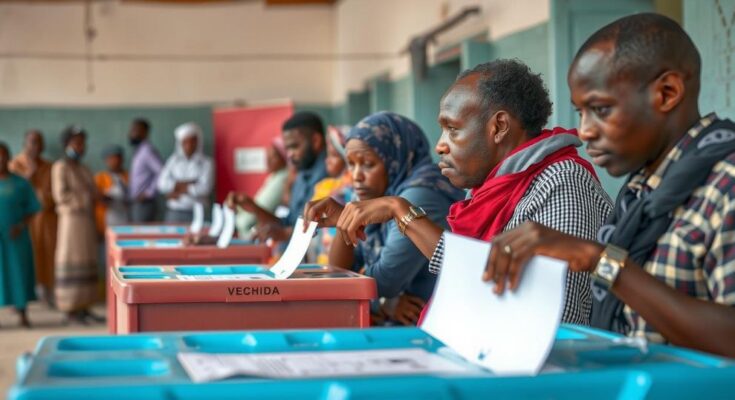Chad’s parliamentary elections saw low voter turnout and widespread opposition boycott, highlighting concerns regarding electoral credibility. Junta leader Mahamat Idriss Deby’s administration faces skepticism from various opposition parties. With ongoing security issues and a lack of trust in the governance process, the future of democracy in Chad remains uncertain.
Chad conducted parliamentary and regional elections on Sunday, characterized by a notably low voter turnout. The main opposition boycotted the elections, expressing distrust toward the governing authorities, led by junta leader Mahamat Idriss Deby, who has directed the country’s transition from military rule since 2021. This electoral event marks the first parliamentary elections in over ten years, occurring in a context where Chad has not experienced a legitimate democratic process since its independence from France in 1960. Although registered voters number at least eight million, polling stations in the capital, N’Djamena, witnessed minimal participation.
Mahamat Issa Hissein, a voter, stated, “We hope that the people we voted for do a good job for a better Chad, a Chad with a future.” In contrast, over ten opposition parties, including the prominent Transformers party led by Succes Masra, denounced the elections as a sham intended to prolong Deby’s power over the nation. Masra, who previously served as prime minister, cautioned voters against participating, suggesting that results would likely be altered.
The elections come amid significant security threats, particularly from Boko Haram, and they follow a period of military governance. Political analysts indicate that maintaining a democratic process is crucial for Chad’s future. They emphasize that this electoral phase is crucial to end the ongoing transition and pave the way for legitimate governance, highlighting the absence of significant opposition as a key shortcoming in this election.
The parliamentary elections in Chad occur after a transitional government period beginning in 2021, following the death of the long-time president, Idriss Deby Itno. The junta led by Mahamat Idriss Deby has attempted to stabilize the country, yet skepticism about the electoral process remains widespread, particularly among opposition parties. This election is the first opportunity in a decade for a democratic exercise but arrives under the shadow of a military regime and ongoing security challenges. The opposition’s boycott highlights deep-rooted mistrust regarding the credibility of both the electoral process and the intentions of the ruling authorities. Chad’s political landscape has been fraught with instability and violence, and while the junta has made moves toward restoring democratic governance, many citizens and political analysts question the commitment of the current administration to actualize this promise.
In conclusion, Chad’s recent parliamentary elections reflect the ongoing struggle between aspirations for democratic governance and the realities of military rule. With significant opposition boycotting the elections and a low turnout, questions remain about the validity of this electoral process. As Chad faces numerous internal and external challenges, the reaffirmation of democratic principles becomes essential for the country’s stability and development. The current transitional government must address the opposition’s concerns to cultivate trust and foster legitimate political engagement among the populace.
Original Source: apnews.com




